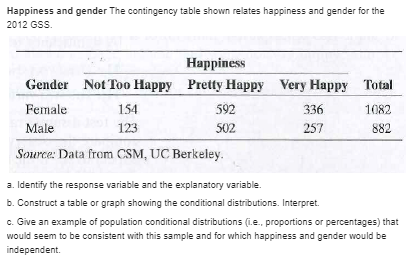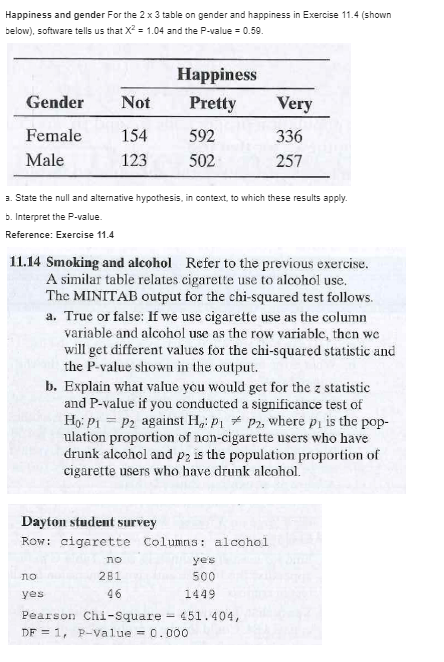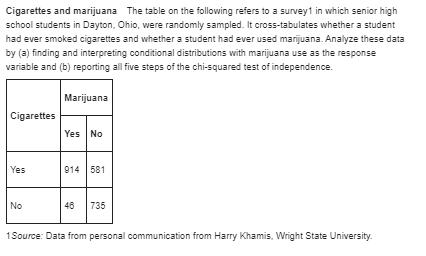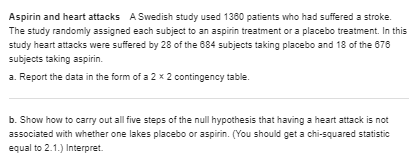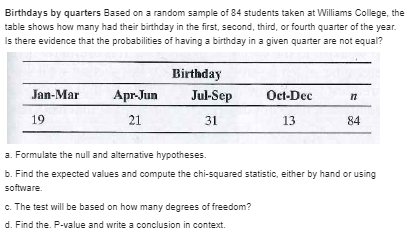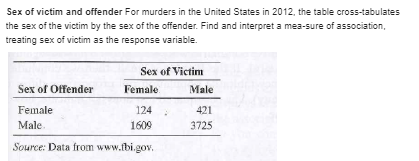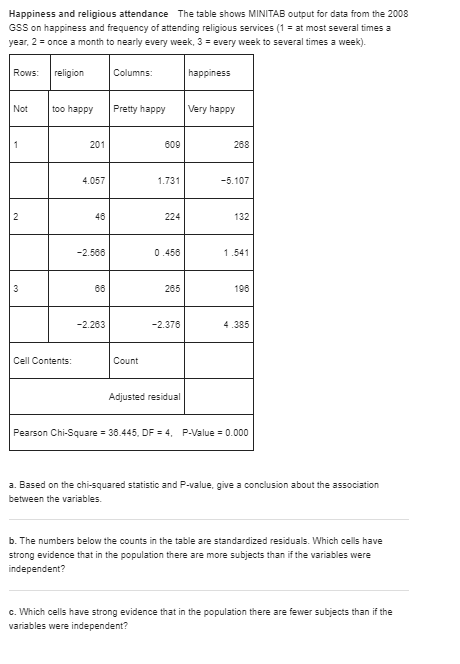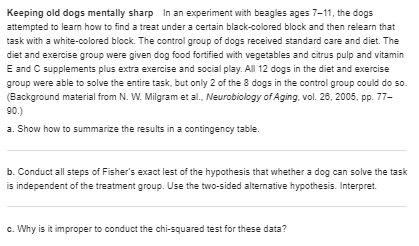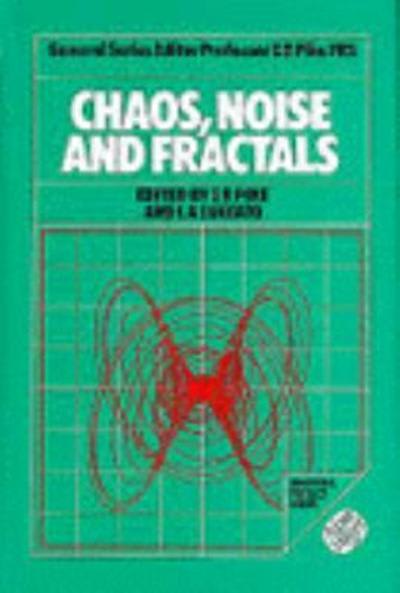need correct answer:-
\fHappiness and gender The contingency table shown relates happiness and gender for the 2012 GSS. Happiness Gender Not Too Happy Pretty Happy Very Happy Total Female 154 592 336 1082 Male 123 502 257 882 Source: Data from CSM, UC Berkeley. a. Identify the response variable and the explanatory variable. b. Construct a table or graph showing the conditional distributions. Interpret. C. Give an example of population conditional distributions (i.e., proportions or percentages) that would seem to be consistent with this sample and for which happiness and gender would be independent.Happiness and gender For the 2 x 3 table on gender and happiness in Exercise 11.4 (shown below), software tells us that X" = 1.04 and the P-value = 0.59. Happiness Gender Not Pretty Very Female 154 592 336 Male 123 502 257 3. State the null and alternative hypothesis, in context, to which these results apply. b. Interpret the P-value. Reference: Exercise 11.4 11.14 Smoking and alcohol Refer to the previous exercise. A similar table relates cigarette use to alcohol use. The MINITAB output for the chi-squared test follows. a. True or false: If we use cigarette use as the column variable and alcohol use as the row variable, then we will get different values for the chi-squared statistic and the P-value shown in the output. b. Explain what value you would get for the z statistic and P-value if you conducted a significance test of Ho: pi = p2 against He: p, # pz, where pi is the pop- ulation proportion of non-cigarette users who have drunk alcohol and pz is the population proportion of cigarette users who have drunk alcohol. Dayton student survey Row: cigarette Columns: alcohol no yes no 281 500 yes 46 1449 Pearson Chi-Square - 451 . 404, DF = 1, P-value = 0. 000Birthdays by quarters Based on a random sample of 84 students taken at Williams College, the table shows how many had their birthday in the first, second, third, or fourth quarter of the year. Is there evidence that the probabilities of having a birthday in a given quarter are not equal? Birthday Jan-Mar Apr-Jun Jul-Sep Oct-Dec 19 21 31 13 84 a. Formulate the null and alternative hypotheses. b. Find the expected values and compute the chi-squared statistic, either by hand or using software. c. The test will be based on how many degrees of freedom? d. Find the. P-value and write a conclusion in context.\fHappiness and religious attendance The table shows MINITAB output for data from the 2008 GSS on happiness and frequency of attending religious services (1 = at most several times a year, 2 = once a month to nearly every week, 3 = every week to several times a week). Rows: religion Columns: happiness Not too happy Pretty happy Very happy 201 809 268 4.057 1.731 -5.107 224 132 -2.568 0 .456 1.541 285 196 -2.283 -2.376 4.385 Cell Contents: Count Adjusted residual Pearson Chi-Square = 36.445, DF = 4, P-Value = 0.000 a. Based on the chi-squared statistic and P-value, give a conclusion about the association between the variables. b. The numbers below the counts in the table are standardized residuals. Which cells have strong evidence that in the population there are more subjects than if the variables were independent? c. Which cells have strong evidence that in the population there are fewer subjects than if the variables were independent?\fDescription and inference a. Distinguish between description and inference as reasons for using statistics. Illustrate the distinction using an example. b. You have data for a population, such as obtained in a census. Explain why descriptive statistics are helpful but inferential statistics are not needed.Is globalization good? The Voice of the People poll CD asks a random sample of citizens from different countries around the world their opinion about global issues. Included in the list of questions is whether they feel that globalization helps their country. The reported results were combined by regions. In the most recent poll, 74% of Africans felt globalization helps their country. whereas 38% of North Americans believe it helps their country. (a) Identify the samples and the populations. (b) Are these percentages sample statistics or population parameters? Explain your

